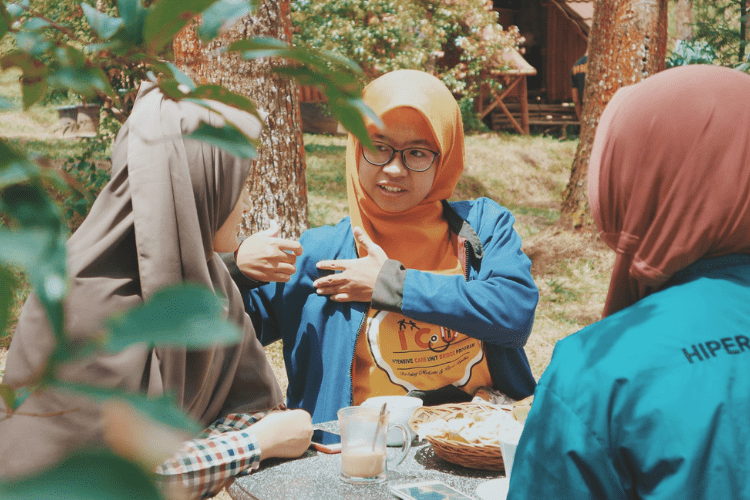When we look at the biggest challenges tourism faces, one of them is a public relations problem.
The act of travel has been packaged as a way to escape life’s daily struggles. It’s a chance for people to relax, shake up their normal routines, and reward themselves. The stories we tell about travel are attractive, predictable, and comfortable.
Yet, the tourism industry has been at the heart of many environmental and social challenges, including overcrowding, creation of carbon emissions, degradation of cultural and historical sites, gentrification due to an increase in short-term rentals, and exploitation of Indigenous people and commoditization of their cultures.
By perpetuating the sanitized story of the travel experience, the tourism industry does itself a disservice. Travelers don’t know what they don’t know. Those working in tourism have historically failed to be transparent and help travelers understand the complex world around them.
The good news is that couched in this challenge of communicating the sanitized travel experience is an incredible opportunity to tell a more honest, interesting, and complete story about the places travelers visit and the people they encounter.
One of the best ways to embrace this opportunity is to intentionally seek out, support, and promote diverse storytellers — people with a wide variety of perspectives and histories, people who aren’t often considered part of the tourism experience, people who have traditionally and purposefully been silenced and oppressed.
Lifting up diverse storytellers is an important stepping stone for building back better and upholding a model of tourism that is more equitable, more sustainable, and less destructive. Regardless of your role in the tourism industry — a DMO, tour operator, content creator, association representative, or other service provider — you have a responsibility to seek out, support, and amplify diverse voices.
Start with these five storytellers.
People Who Don’t Identify With The Dominant Culture and Marginalized People
What is the predominant story in a destination? That’s probably an easy question to answer: It’s the story you already know and that is commonly told or perpetuated in the travel narrative. Now ask yourself who that story was built upon. Who lived on the land first? Who has been displaced? Who is shunned or silenced?
There are likely Indigenous people who have called a destination home for generations. Are there religious minorities? Is there a caste or socio-economic system that traditionally silences people?
A growing number of companies offer day and multi-day tours led by marginalized people such as homeless and formerly homeless people, former gang members, refugees, and human trafficking survivors. Specifically seek out experiences led by ethnic and racial minorities, who have long had — and continue to have — their stories and voices silenced. These tours provide an alternative narrative and perspective while economically supporting marginalized people and initiatives. (To be clear, these types of tours are different from “slum tours” or other similar experiences that commoditize and exploit people.)
Social Impact Organizations and Social Enterprises
Social impact organizations and enterprises address social, cultural, and environmental challenges and issues ranging from food waste and access to education to coral restoration and animal trafficking. These cause-driven businesses and organizations focus on the common good through a wide range of projects and initiatives.
These organizations often offer valuable insight into solutions to local and/or global problems. Highlighting local social impact organizations amplifies grassroots businesses and local change makers. It also educates travelers about organizations they can support that are doing meaningful work in sustainable development.
Untraditional Travel Service Providers
Tour guides are obvious on-the-ground storytellers: They are likely local themselves and have valuable and unique perspectives shaped by their own experiences. Plus, they are groomed to answer travelers’ questions based on their experience working as tour guides.
Yet there are dozens of other service providers that travelers meet along the way. Drivers, accommodation owners, wait staff, porters, and dive instructors (just to name a few examples) also have rich, diverse, and interesting stories built around their personal knowledge of a place and professional interactions with travelers.
The Average Person
So much can be learned about a place and its culture through conversation. In an ideal world, tourism would be integrated into a community’s fabric. It wouldn’t exist in a silo, with locals going about their lives and a strange, parallel world of tourism existing alongside it. To help break this silo, it’s time to empower average local people to share their stories with visitors — the good, the bad, the messy, the mundane.
Look for people of different ages and abilities: Someone who navigates the city with a physical disability experiences it differently than an able-bodied person. People who have lived somewhere for a long time have different experiences than those who recently moved there. Seek out farmers and fishermen, small business owners and educators, college students and retirees. They all have different opinions, perspectives, insights, and stories to tell, truly helping to turn a destination into a three-dimensional, dynamic destination.
The Person You Want To Hear From
Have you ever visited a place and found yourself asking, “I wonder who…?” or “What’s the story with…?” What untold story intrigues you about a certain place or culture? If you’re asking those questions, other people are too.
Even though travelers don’t know what they don’t know, curiosity is an innately human characteristic. Get into travelers’ heads and try to anticipate where this curiosity leads. Don’t underestimate their capability to grapple with complex issues, challenging narratives, and dark moments in history.
In fact, laying the truth out on the table and making these stories more accessible is one of the best things the tourism industry can do to chart a more responsible path forward.
Redefining travel as a pristine activity is one of the storytelling myths the tourism industry needs to smash. Learn more about this and four other reasons to disrupt storytelling in the tourism industry in this free on-demand webinar.



